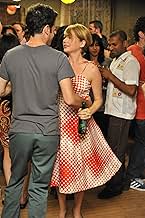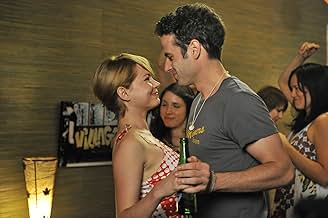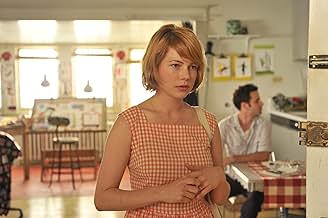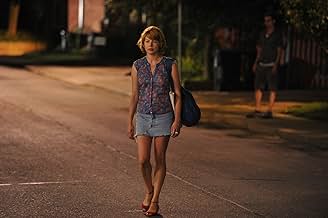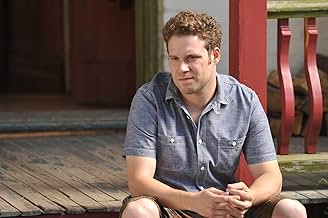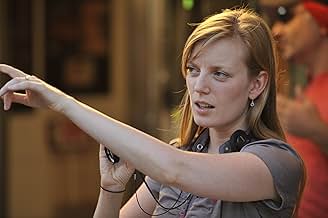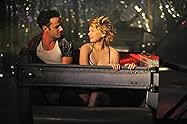ÉVALUATION IMDb
6,5/10
31 k
MA NOTE
Une femme mariée heureuse tombe amoureuse de l'artiste qui vit de l'autre côté de la rue.Une femme mariée heureuse tombe amoureuse de l'artiste qui vit de l'autre côté de la rue.Une femme mariée heureuse tombe amoureuse de l'artiste qui vit de l'autre côté de la rue.
- Prix
- 3 victoires et 19 nominations au total
Vanessa Carter
- Tony
- (as Vanessa Coelho)
Ciarán MacGillivray
- Soldier
- (as Ciaran MacGillivray)
Histoire
Le saviez-vous
- AnecdotesWriter and Director Sarah Polley chose to use the song "Video Killed the Radio Star" in key scenes, because it was her brother's favorite song.
- GaffesIn the beginning of the film a day passes by showing the relative movement of the sun - the light moving on the walls. The sun moves from west to east.
- ConnexionsFeatured in Great MoVie Mistakes (2013)
- Bandes originalesGreen Mountain State
Written & Performed by Corinna Rose & The Rusty Horse Band
Used by permission of Corinna Rose & The Rusty Horse Band (SOCAN)
Commentaire en vedette
Common terms associated with movies about infidelity would be "lust," "passion" and "betrayal," yet all those things are suspiciously absent from Sarah Polley's infidelity drama, "Take This Waltz." Her film is about as anti-soap opera as you can get — careful to avoid melodrama and dedicated to sidestepping any and all conventional depictions of adult relationships in film.
It seems odd to call Polley bold for showing it like it is, the way that she drags us through the head of her main character, Margot (Michelle Williams), who so undeniably loves her husband, Lou (Seth Rogen), yet cannot deny her feelings for Daniel (Luke Kirby), a man she meets while away for work who turns out to be her neighbor. However, when it comes to filmmaking, anything that deviates from Hollywood reality can make an audience uncomfortable, so it takes some guts to ignore that filmmaking impulse.
Consequently, a good chunk of viewers will be turned off or frustrated by "Take This Waltz," losing patience with the inaction of its characters and pulling their hair out over the tension oozing out of the most casual character interactions. Yes, "Take This Waltz" can be so uneventful that it verges on pointless, but in time Polley's intentions become very clear.
As Margot and Daniel get closer, they don't really get closer, and as Margot and Lou drift apart, they actually come off as in love as they've ever been. For much of the film, it's in Margot's head that the cheating is actually happening. Her thoughts and actions are not in sync and it becomes extremely difficult for us to find empathy for her because we feel as though she needs to act on her feelings, to either voice her displeasure to Lou or throw herself at Daniel. That's the Hollywood impulse calling.
Polley continues to resist, and as challenging as it becomes to watch at times, her film comes out better for sticking to its convictions. As she clearly intended, a switch flips in a scene in which Margot and Daniel ride an indoor Scrambler as "Video Killed the Radio Star" plays, an in the loopy chaos of the scene, we (and Margot) find a certain clarity in understanding what's going on between the main characters.
There's a definite phantasmagoria to Polley's style as well that while visually engaging contrasts a bit with what's otherwise such a nuanced, completely believable film. Several scenes play out like dream sequences, but we later can confirm they actually happened. She seems quite content to toy with our expectations and challenge what we think we know to be true about how love works.
You couldn't cast a better actress than Williams with a performance that's so hard to pull off. We only identify with Margot because we see her humanity, but it's tough to understand her and in some cases even like as a third-party observer of her story. Williams should be lauded for volunteering for this experiment and selling it as well as she does, especially when you consider that Kirby is a total unknown and Rogen is a poster child for modern comedy, for formulaic comedies that are such a far cry from "Take This Waltz."
The end of the movie is bound to bother a lot of people, while others will be intrigued at the choice and make peace with what Polley has to say because she frankly makes a good argument. Fidelity gets such a black-and-white portrayal in film and television, though maybe that's a societal thing because of its prominence in religious code. Nevertheless, she utilizes every tool at her disposal to present the gray area that we so quickly jump to deny and shudder to embrace.
It's tough to really enjoy a film that doesn't emotionally click, in which we don't feel with our hearts that things should've turned out how they did, but Polley has such a beautiful directorial style and conveys her intentions so clearly that "Take This Waltz" warrants a certain degree of respect for its bold yet so honest and impressively perceptive take on love.
~Steven C
Thanks for reading! Visit moviemusereviews.com for more!
It seems odd to call Polley bold for showing it like it is, the way that she drags us through the head of her main character, Margot (Michelle Williams), who so undeniably loves her husband, Lou (Seth Rogen), yet cannot deny her feelings for Daniel (Luke Kirby), a man she meets while away for work who turns out to be her neighbor. However, when it comes to filmmaking, anything that deviates from Hollywood reality can make an audience uncomfortable, so it takes some guts to ignore that filmmaking impulse.
Consequently, a good chunk of viewers will be turned off or frustrated by "Take This Waltz," losing patience with the inaction of its characters and pulling their hair out over the tension oozing out of the most casual character interactions. Yes, "Take This Waltz" can be so uneventful that it verges on pointless, but in time Polley's intentions become very clear.
As Margot and Daniel get closer, they don't really get closer, and as Margot and Lou drift apart, they actually come off as in love as they've ever been. For much of the film, it's in Margot's head that the cheating is actually happening. Her thoughts and actions are not in sync and it becomes extremely difficult for us to find empathy for her because we feel as though she needs to act on her feelings, to either voice her displeasure to Lou or throw herself at Daniel. That's the Hollywood impulse calling.
Polley continues to resist, and as challenging as it becomes to watch at times, her film comes out better for sticking to its convictions. As she clearly intended, a switch flips in a scene in which Margot and Daniel ride an indoor Scrambler as "Video Killed the Radio Star" plays, an in the loopy chaos of the scene, we (and Margot) find a certain clarity in understanding what's going on between the main characters.
There's a definite phantasmagoria to Polley's style as well that while visually engaging contrasts a bit with what's otherwise such a nuanced, completely believable film. Several scenes play out like dream sequences, but we later can confirm they actually happened. She seems quite content to toy with our expectations and challenge what we think we know to be true about how love works.
You couldn't cast a better actress than Williams with a performance that's so hard to pull off. We only identify with Margot because we see her humanity, but it's tough to understand her and in some cases even like as a third-party observer of her story. Williams should be lauded for volunteering for this experiment and selling it as well as she does, especially when you consider that Kirby is a total unknown and Rogen is a poster child for modern comedy, for formulaic comedies that are such a far cry from "Take This Waltz."
The end of the movie is bound to bother a lot of people, while others will be intrigued at the choice and make peace with what Polley has to say because she frankly makes a good argument. Fidelity gets such a black-and-white portrayal in film and television, though maybe that's a societal thing because of its prominence in religious code. Nevertheless, she utilizes every tool at her disposal to present the gray area that we so quickly jump to deny and shudder to embrace.
It's tough to really enjoy a film that doesn't emotionally click, in which we don't feel with our hearts that things should've turned out how they did, but Polley has such a beautiful directorial style and conveys her intentions so clearly that "Take This Waltz" warrants a certain degree of respect for its bold yet so honest and impressively perceptive take on love.
~Steven C
Thanks for reading! Visit moviemusereviews.com for more!
- Movie_Muse_Reviews
- 25 déc. 2012
- Lien permanent
Meilleurs choix
Connectez-vous pour évaluer et surveiller les recommandations personnalisées
Détails
- Date de sortie
- Pays d’origine
- Sites officiels
- Langue
- Aussi connu sous le nom de
- Take This Waltz: Une histoire d'amour
- Lieux de tournage
- Louisbourg, Nova Scotia, Canada(lighthouse)
- sociétés de production
- Consultez plus de crédits d'entreprise sur IMDbPro
Box-office
- Brut – États-Unis et Canada
- 1 239 692 $ US
- Fin de semaine d'ouverture – États-Unis et Canada
- 137 019 $ US
- 1 juill. 2012
- Brut – à l'échelle mondiale
- 4 965 950 $ US
- Durée1 heure 56 minutes
- Couleur
- Mixage
- Rapport de forme
- 1.85 : 1
Contribuer à cette page
Suggérer une modification ou ajouter du contenu manquant








